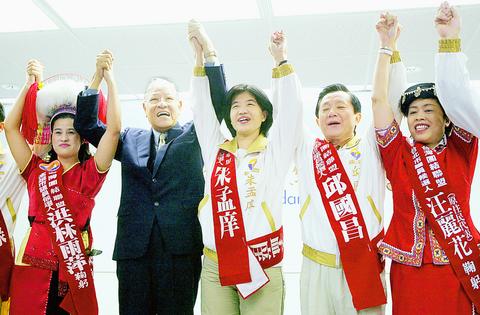Former president Lee Teng-hui (
The former president is scheduled to depart for Tokyo on Nov. 23 where he will be a guest speaker for Keio University, one of the nation's most prestigious schools, on the following day.
Lee is expected to deliver a one-hour speech entitled "the Spirit of Japan."

PHOTO: CHEN CHENG-CHANG, TAIPEI TIMES
Appearing at TSU headquarters yesterday to stump for the party's city councilor candidates, Lee told reporters he had not yet applied for a visa. He said he hoped the media would not exaggerate the importance of his trip because too many reports might hinder his plan.
"I will file my visa application when you [the reporters] are quiet," he said.
Lee's trips to Japan have always been a sensitive issue as China scorns Lee for trying to break Taiwan's diplomatic isolation during his 12 years in power. Beijing has warned Japan not to allow Lee to visit.
In April of last year, Lee was in Japan to undergo medial treatment for a heart ailment.
But his trip divided Japanese officials and his visa was not issued until the last minute after Lee mocked the nation by saying that "the guts of the Japanese government are as small as that of a mouse."
But TSU officials are optimistic about Lee's forthcoming trip later this month.
Chen Horng-chi (
Chen, the newly-appointed director for the TSU's organization department, said several Japanese congressmen and public opinion in Japan are supportive of Lee's trip.
Chen said he had questioned the Japanese Interchange Association in Taipei, whose officials said that Lee's visits to Japan always touch a political nerve.
The new TSU director noted that to express their sincerity, three Japanese students from Keio University had come to Taiwan last month to extend their invitation to the former president in person. The former president was said to be deeply moved by their sincerity.
Lee's trip has been arranged by Tokyo-based national policy adviser Alice King (金美齡).
King said last month, when she was in Taipei, that Lee would probably be allowed to visit Japan because the Japanese public is highly supportive of his visits.

The manufacture of the remaining 28 M1A2T Abrams tanks Taiwan purchased from the US has recently been completed, and they are expected to be delivered within the next one to two months, a source said yesterday. The Ministry of National Defense is arranging cargo ships to transport the tanks to Taiwan as soon as possible, said the source, who is familiar with the matter. The estimated arrival time ranges from late this month to early next month, the source said. The 28 Abrams tanks make up the third and final batch of a total of 108 tanks, valued at about NT$40.5 billion

Two Taiwanese prosecutors were questioned by Chinese security personnel at their hotel during a trip to China’s Henan Province this month, the Mainland Affairs Council (MAC) said yesterday. The officers had personal information on the prosecutors, including “when they were assigned to their posts, their work locations and job titles,” MAC Deputy Minister and spokesman Liang Wen-chieh (梁文傑) said. On top of asking about their agencies and positions, the officers also questioned the prosecutors about the Cross-Strait Joint Crime-Fighting and Judicial Mutual Assistance Agreement, a pact that serves as the framework for Taiwan-China cooperation on combating crime and providing judicial assistance, Liang

A group from the Taiwanese Designers in Australia association yesterday represented Taiwan at the Midsumma Pride March in Melbourne. The march, held in the St. Kilda suburb, is the city’s largest LGBTQIA+ parade and the flagship event of the annual Midsumma Festival. It attracted more than 45,000 spectators who supported the 400 groups and 10,000 marchers that participated this year, the association said. Taiwanese Designers said they organized a team to march for Taiwan this year, joining politicians, government agencies, professionals and community organizations in showing support for LGBTQIA+ people and diverse communities. As the first country in Asia to legalize same-sex

MOTIVES QUESTIONED The PLA considers Xi’s policies toward Taiwan to be driven by personal considerations rather than military assessment, the Epoch Times reports Chinese President Xi Jinping’s (習近平) latest purge of the Chinese People’s Liberation Army (PLA) leadership might have been prompted by the military’s opposition to plans of invading Taiwan, the Epoch Times said. The Chinese military opposes waging war against Taiwan by a large consensus, putting it at odds with Xi’s vision, the Falun Gong-affiliated daily said in a report on Thursday, citing anonymous sources with insight into the PLA’s inner workings. The opposition is not the opinion of a few generals, but a widely shared view among the PLA cadre, the Epoch Times cited them as saying. “Chinese forces know full well that